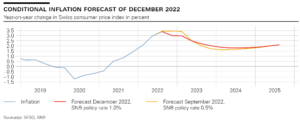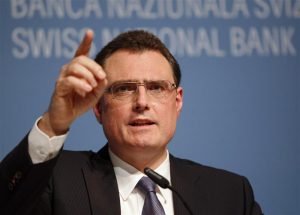Ladies and gentlemen
It is my pleasure to welcome you to the news conference of the Swiss National Bank. I would also like to welcome all those who are joining us today online. After our introductory remarks, the members of the Governing Board will take questions from journalists as usual.
Monetary policy decision
I will begin with our monetary policy decision. We have decided to tighten our monetary policy further and to raise the SNB policy rate by 0.5 percentage points to 1.0%. In doing so, we are countering increased inflationary pressure and a further spread of inflation. It cannot be ruled out that additional rises in the SNB policy rate will be necessary to ensure price stability over the medium term. To provide appropriate monetary conditions, we are also
Articles by Thomas Jordan
Thomas Jordan: Monetary policy under new constraints: challenges for the Swiss National Bank
August 29, 2022The pandemic and the war in Ukraine have fundamentally changed the constraints on monetary policy. Uncertainty has increased strongly in many respects, and there has been a sharp rise in inflation.
In June 2022, the SNB raised its policy rate for the first time in 15 years and announced that further increases may be necessary in the foreseeable future. The decision was taken against a backdrop of high uncertainty. Interpreting the current data is difficult, particularly distinguishing between temporary and sustained inflationary pressure. The longer-term outlook for monetary policy is also highly uncertain. Structural factors such as the green transition or deglobalisation could lead to persistently higher inflationary pressure in the coming years.
In the
Read More »Тhomas Jordan: Introductory remarks, news conference
June 16, 2022Ladies and gentlemen
It is my pleasure to welcome you to the Swiss National Bank’s news conference. In my remarks, I will begin by explaining our monetary policy decision and our assessment of the economic situation. After that, Fritz Zurbrügg will present the key messages from this year’s Financial Stability Report. Andréa Maechler will then comment on the situation on the financial markets and the implementation of monetary policy. We will – as ever – be pleased to take your questions afterwards.
Мonetary policy decision
I will begin with our monetary policy decision. We have decided to tighten our monetary policy and to raise the SNB policy rate and the interest rate on sight deposits at the SNB by half a percentage point to −0.25%. In doing so, we are seeking
Thomas Jordan: Introductory remarks, news conference
June 21, 2018– Click to enlarge
Ladies and gentlemen
It is a pleasure for me to welcome you to the Swiss National Bank’s news conference. I will begin by explaining our monetary policy decision and our assessment of the economic situation. I would also like to briefly touch on the rejection of the sovereign money initiative by the people and the cantons as well as a publication marking the tenth anniversary of the SNB’s educational programme, Iconomix.
I will then hand over to Fritz Zurbrügg, who will present this year’s Financial Stability Report. After that, Andréa Maechler will talk about the situation on the financial markets, the state of play with ongoing reference interest rate reforms, and the fifth anniversary of
Why sovereign money would hurt Switzerland?
May 4, 2018Swiss National Bank (SNB) Chairman Thomas Jordan speaks to the media during a news conference in Bern June 14, 2012. REUTERS/Ruben Sprich – Click to enlarge
Ladies and gentlemen
Today, the Swiss Institute of Banking and Finance at the University of St. Gallen celebrates its 50th anniversary. Let me extend my sincere congratulations on reaching this milestone. Our financial system has evolved steadily over the past five decades. In the early years of the institute, the world was still dominated by Bretton Woods, the post-war monetary system with its fixed exchange rates and the US dollar as anchor currency. Thereafter, flexible exchange rates were the order of the day, and more recently, banks have had to face the
News conference Swiss National Bank, Thomas Jordan
December 14, 2017Thomas Jordan, Chairman of the Governing Board of the Swiss National Bank
News conference of the Swiss National Bank, Berne, 14.12.2017
Thomas Jordan – Click to enlarge
Introductory remarks by Thomas Jordan
Ladies and gentlemen
It is a pleasure for me to welcome you to the Swiss National Bank’s news conference. I will begin by explaining our monetary policy decision and our assessment of the economic situation. I will then hand over to Fritz Zurbrügg, who will speak about current developments in the area of financial stability. After that, Andréa Maechler will review the situation on the financial markets and the progress in reference interest rate reform. Finally, we will – as ever – be pleased to take your
Read More »News conference Swiss National Bank, Thomas Jordan
June 15, 2017Thomas Jordan, Chairman of the Governing Board of the Swiss National Bank
News conference of the Swiss National Bank, Berne, 16.06.2016
Thomas Jordan – Click to enlarge
Introductory remarks by Thomas Jordan
Ladies and gentlemen
It is a pleasure for me to welcome you to the Swiss National Bank’s news conference. I will begin by explaining our monetary policy decision and our assessment of the economic situation. I will then hand over to Fritz Zurbrügg, who will present this year’s Financial Stability Report. After that, Andréa Maechler will review developments on the financial markets. Finally, we will – as ever – be pleased to take your questions.
Monetary policy decision
Let me begin with our monetary policy
News conference Swiss National Bank, Thomas Jordan
June 17, 2016Thomas Jordan, Chairman of the Governing Board of the Swiss National Bank
News conference of the Swiss National Bank, Berne, 16.06.2016
Complete text: PDF (96 KB)
Major points:
SNB rate remains –0.75% and the target range for the three-month Libor unchanged at between
–1.25% and –0.25%.
Negative interest helps to maintain the interest rate differential between the Swiss franc
and other currencies, hence investors prefer to park cash in other currencies (currently
in particular the dollar)
SNB is ready to intervene in the FX market
Inflation will rise faster over the coming quarters than the SNB predicted in March,
in particular due to rising oil prices
Swiss economy to grow 1% to 1.5% in 2016
Exports recovered, even in the machinery sector that has to compete with Germany’s weak euro
Introductory remarks by Thomas Jordan
Ladies and gentlemen
It is a pleasure for me to welcome you to the Swiss National Bank’s news conference. I will begin by explaining our monetary policy decision and our assessment of the economic situation. I will then hand over to Fritz Zurbrügg, who will present this year’s Financial Stability Report. After that, Andréa Maechler will review the situation on the financial markets and outline some innovations affecting financial market infrastructure.
Read More »2015-12-10 – Speech – Thomas Jordan, Chairman of the Governing Board of the Swiss National Bank: Introductory Remarks, news conference
December 10, 2015[unable to retrieve full-text content](2015-12-10, News conference of the Swiss National Bank, Berne)
Read More »2015-11-03 – Speech – Thomas Jordan, Chairman of the Governing Board of the Swiss National Bank: The SNB’s monetary policy and the Swiss financial centre
November 3, 2015Thomas Jordan, Chairman of the Governing Board of the Swiss National Bank
Rencontres économiques de Genève, première édition , 03.11.2015
Complete text
The activities of the Swiss National Bank (SNB) and the Swiss financial sector are closely interlinked. On the one hand, the SNB acts as the bank of banks, providing a stable currency, liquidity and a payment system on which banks rely. By ensuring price stability and contributing to financial stability, the SNB helps create the conditions in which the financial sector can flourish. On the other hand, the financial sector acts as an intermediary between monetary policy decisions and the overall economy. It contributes to an efficient economic system and to the prosperity of our country.
The long-term goals of the SNB and the banking sector usually go hand-in-hand. Monetary stability and a strong financial sector are in our common interest. However, the benefits of Switzerland having its own currency and conducting its own monetary policy can imply substantial costs in times of crisis. Since the beginning of the financial crisis, Switzerland has been particularly heavily affected by international disturbances. The entire Swiss economy has had to adapt to new international monetary conditions and a significantly overvalued Swiss franc.
Read More »Keith Weiner in Zurich
October 13, 2015Keith Weiner, chairman of the Gold Standard Institute United States, will be presenting in Zurich, this Wednesday, October 14 at 18.30.
Title: Our Monetary System is Failing, and what we can do against it
We hope that the Swiss National Bank will remain safe, during the collapse of the monetary system. We fear the collapse because money flows will direct towards Switzerland again and threaten the solvability of our central bank.
Some background in English on the letter to Tsipras, in German here.
Venue:
See more for Gold Standard
Read More »SNB & CHF, the blog on a beleaguered central bank, its currency, on gold and astute investments
October 12, 2015Over four years our association of supporters of Austrian Economics from Switzerland, Germany and Austria and helpful hands from all over the world expressed opposition against the CHF cap in in-numerous pages. Finally the SNB agreed to the wishes of Swiss consumers and gave up the cap that effectively represented a tax on consumption and extra-profits for companies and close friends of the central bank.
Swiss Inflation Watch: Swiss inflation
As monetarists & Austrians we expect Swiss price inflation > Eurozone inflation in some time. The main driver will be the Swiss asset price boom that first will push up rents, later wages and finally price inflation. Yet inflation on Swiss rents is low, because of regulation (indexation to interest rates).
Swiss Yearly Money Inflation (M3) has slowed down from 8% to 3%Swiss Price Inflation: Fortunately still low: -1.4% y/y CPI and -1.2% HICP,thanks to imported deflation from the euro zone, but internal inflation >0Other HICPs Y/Y: Eurozone (outright deflation) 1.1 0.9, 0.7,0.5 0.4% -0.2% -0.1%Germany (near deflation):+0.0%Spain (outright deflation) 0.5 0.3, 0.2, 0.0% -0.5%,-0.2% -0.9%Italy (near deflation): 0.5 0.3, 0.2, 0.0-0.2 0.0% +0.2%
Economic Background:
Dr.







